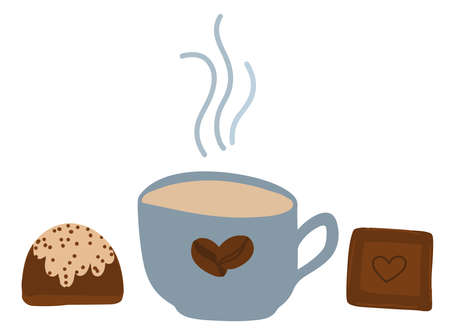Introduction: The Changing Landscape of British Coffee Habits
Over the past decade, the British coffee scene has undergone a remarkable transformation. Once dominated by traditional black tea and milky builders brews, the UK’s café culture is now a vibrant tapestry woven from global influences and evolving lifestyles. More Britons than ever are swapping their morning cuppa for a quality flat white or an ethically sourced filter brew. But beneath this surface-level enthusiasm for coffee, deeper trends are emerging—particularly in response to growing concerns about health, sustainability, and personal wellbeing. As headlines increasingly spotlight issues like caffeine sensitivity, eco-friendly choices, and plant-based diets, consumers across Britain are rethinking what goes into their cups. This shift isn’t merely a fleeting fad; it reflects broader lifestyle changes that are reshaping daily routines, social rituals, and even the way we define indulgence or self-care. Against this backdrop, the rise of decaf options and innovative coffee alternatives stands out as a key development. From oat milk lattes to chicory root blends and adaptogenic mushroom coffees, Britons are exploring new ways to enjoy their favourite beverage rituals—often with an eye on both personal health and planetary impact. In this article, we’ll explore where these trends are heading and what they might mean for the future of British coffee culture.
2. Decaf’s Rising Popularity: Health and Wellbeing Drivers
In recent years, the British public has shown a marked shift towards decaffeinated coffee, driven by an evolving focus on health and wellbeing. This trend is closely linked to broader lifestyle changes, where wellness is prioritised over the traditional caffeine kick. Several factors are influencing this move away from regular coffee to its decaf counterpart.
Wellness Trends and Consumer Choices
Britons are increasingly aware of the impact of diet on long-term health. With growing interest in mindful consumption, many are questioning the role of caffeine in their daily routines. From yoga classes to meditation apps, holistic health practices are now mainstream—and these trends extend to what people put in their mugs each morning.
Medical Advice and Public Awareness
Healthcare professionals across the UK often advise individuals with certain medical conditions—such as high blood pressure, anxiety disorders, or pregnancy—to moderate their caffeine intake. This has led to greater visibility for decaf options in cafés and supermarkets. The NHS and various health campaigns have further contributed by highlighting potential side effects of excessive caffeine, such as disrupted sleep or increased heart rate.
Shifting Attitudes Towards Caffeine
The historical association of coffee with productivity and alertness is being re-examined. Many now view reducing caffeine not as a sacrifice but as a conscious lifestyle upgrade. The new narrative positions decaf as a sophisticated, responsible choice that aligns with self-care values.
| Driver | Impact on Decaf Popularity |
|---|---|
| Wellness Trends | Encourages mindful consumption; boosts demand for lower-caffeine options |
| Medical Advice | Leads at-risk groups to seek decaf alternatives |
| Changing Social Attitudes | Makes decaf more socially acceptable and desirable among younger generations |
The cumulative effect is clear: decaf is no longer viewed as simply a second-best substitute but as a purposeful choice within the wider British lifestyle landscape. As these drivers continue to gain momentum, it’s likely that decaf will become an even more prominent feature in cafés, offices, and homes across the UK.

3. Plant-Based and Novel Coffee Alternatives
The British appetite for innovation is clearly reflected in the growing popularity of plant-based and novel coffee alternatives. As health consciousness and sustainability concerns rise, more people are turning away from traditional caffeinated drinks and exploring substitutes like barley coffee, chicory blends, and oat-based beverages. These alternatives not only offer a caffeine-free experience but also align with the UK’s focus on supporting local agriculture and reducing environmental impact.
Barley coffee, once a staple in post-war Britain due to rationing, is making a sophisticated comeback. Its nutty, roasted flavour profile appeals to those seeking something familiar yet distinct from standard decaf. Meanwhile, chicory root—long popular in continental Europe—is finding its way into British cafés and homes as a rich, earthy option that pairs well with milk or dairy-free alternatives.
Oat-based blends have seen particular growth, paralleling the UK’s embrace of oat milk as a mainstream dairy alternative. These blends often combine oats with other grains or botanicals, resulting in creamy, comforting drinks that are both gentle on the palate and versatile for hot or iced preparations. Artisanal roasters and independent coffee shops across London, Manchester, and beyond are experimenting with these ingredients, offering new taste experiences that reflect both tradition and forward-thinking creativity.
At home, Britons are increasingly stocking their pantries with these novel options. Supermarkets now feature dedicated shelves for plant-based coffee substitutes, while online retailers offer subscription boxes delivering monthly selections of innovative blends. This shift highlights not only evolving preferences but also the British knack for blending heritage with innovation—a trend likely to shape the country’s beverage culture well into the future.
4. Sustainability and Ethical Considerations
The British public’s growing environmental consciousness is profoundly influencing the way decaf coffee and coffee alternatives are sourced, produced, and packaged. As concerns about carbon footprint, plastic waste, and ethical supply chains become more mainstream, brands in the UK are under increasing pressure to adapt their practices to align with these values.
One of the most visible shifts is in packaging. Many British consumers now actively seek out products with compostable, recyclable, or reduced-plastic packaging. This not only applies to retail coffee bags but also to takeaway cups and pods. Forward-thinking companies are responding by introducing fully biodegradable solutions and championing “zero waste” initiatives in their shops.
Sourcing is equally under scrutiny. There is a notable rise in demand for decaf coffees that use water-based or natural CO2 processes instead of chemical solvents, as these are perceived as safer for both people and the planet. Similarly, plant-based alternatives such as chicory or barley drinks are favoured when their ingredients are locally grown or certified organic. The Fairtrade movement continues to gain traction as shoppers expect transparency from bean to cup.
Key Sustainability Practices in the UK Coffee Market
| Practice | Description | Consumer Impact |
|---|---|---|
| Eco-friendly Packaging | Use of recyclable, compostable or reusable materials | Reduces household waste and appeals to eco-conscious buyers |
| Ethical Sourcing | Direct trade relationships, Fairtrade certification, local sourcing for alternatives | Ensures fair wages for farmers and supports sustainable agriculture |
| Chemical-free Decaffeination | Water process or CO2 methods over chemical solvents | Lowers environmental impact and reassures health-focused consumers |
| Carbon Neutral Initiatives | Offsetting emissions through reforestation or renewable energy projects | Strengthens brand trust among climate-aware shoppers |
The Road Ahead: Ethical Expectations Rising
This heightened awareness isn’t just a passing trend; it’s shaping permanent expectations within British culture. Cafés proudly display their ethical credentials, while supermarket shelves clearly mark certifications like Rainforest Alliance or Soil Association Organic. With consumers increasingly willing to pay a premium for responsibly sourced products, sustainability is set to remain at the heart of future developments in decaf and coffee alternatives throughout the UK.
5. The Role of Technology and Local Innovation
As British tastes evolve, technology and local innovation are driving profound changes in the decaf and coffee alternatives scene. In recent years, UK-based start-ups and roasters have been at the forefront of developing advanced decaffeination processes that preserve more of the coffee’s natural flavours. For example, several independent roasteries across London, Bristol, and Edinburgh have invested in Swiss Water and CO2-based decaf technologies—methods known for their minimal chemical use and superior taste outcomes.
Beyond traditional coffee, British innovators are also exploring creative beverage alternatives such as barley-based ‘coffee’, chicory blends, and mushroom-infused drinks. These innovations often stem from small-batch producers who focus on sustainability and provenance, aligning with the UK consumer’s increasing demand for traceable and ethical products.
Start-ups like Perky Blenders and Union Hand-Roasted Coffee are collaborating with local universities to experiment with new roasting profiles that enhance the taste complexity of decaf beans. Meanwhile, regional tech incubators support companies experimenting with plant-based milks tailored to pair perfectly with decaf or alternative beverages—a subtle but significant shift in how Brits experience their daily cup.
Such technological progress is not only about flavour; it’s also about transparency. Blockchain-backed traceability systems are being trialled by some UK roasters, enabling consumers to follow their decaf or alternative blend from farm to cup. This builds trust and adds a layer of storytelling that resonates with a British audience increasingly concerned about authenticity and ethics.
In sum, the UK’s approach is distinctly local yet globally minded: leveraging cutting-edge technology while honouring community values. As these trends mature, expect Britain’s decaf and coffee alternatives sector to continue setting benchmarks for quality, sustainability, and ingenuity within Europe and beyond.
6. British Social Rituals Reimagined
Coffee and tea have long been central to British social life, shaping moments from workplace breaks to the cherished afternoon gathering. Yet, as decaf and coffee alternatives gain traction, these time-honoured rituals are evolving to reflect a new era of wellness and inclusivity.
Workplace Brews: Adapting to New Preferences
The classic “cuppa” during office hours is undergoing a transformation. As more Britons seek caffeine-free or plant-based beverages—whether for health, lifestyle, or ethical reasons—the communal kitchen now offers mushroom lattes, herbal infusions, and chicory brews alongside traditional options. This shift signals an increased awareness of individual needs while still preserving the camaraderie of the shared break.
Afternoon Gatherings: Beyond Black Tea
Afternoon tea remains an iconic British tradition, but its beverage menu is expanding. Decaf blends and inventive alternatives like roasted barley “coffee” or dandelion root drinks now find a place beside Earl Grey and Assam. Hosts can cater to a wider array of guests, making gatherings more inclusive without sacrificing ritual or hospitality.
Cultural Signals: Wellness and Inclusivity
This evolution in beverage choices reflects deeper cultural trends. The rise of coffee alternatives in British settings points to a society increasingly focused on wellbeing, open-mindedness, and sustainability. These changes do not replace cherished customs—they reimagine them for contemporary values.
The Future Table
Ultimately, as decaf and alternative drinks integrate into daily routines—from the boardroom to the living room—they reinforce Britain’s ability to adapt longstanding traditions to the tastes and priorities of each generation. The result is a modernised social landscape where everyone has a seat at the table—and a cup that suits their lifestyle.
7. Conclusion: Looking Ahead to the British Coffee Scene
As we reflect on the evolving landscape of decaf and coffee alternatives in the UK, it’s clear that British tastes are becoming more discerning and health-conscious. The predicted trajectory suggests that demand for decaffeinated options and innovative substitutes will continue to grow, driven by a desire for balance between enjoyment and wellbeing. Sustainability, provenance, and quality are likely to remain at the forefront of consumer values, with British drinkers expecting transparency from brands and cafés alike. While tradition holds strong in many corners—think of the cherished flat white or a well-brewed cup of builder’s tea—the willingness to experiment is unmistakable, especially among younger generations. As plant-based milks, adaptogenic blends, and even caffeine-free botanical infusions gain traction, the future British coffee scene promises a blend of heritage and forward-thinking innovation. Ultimately, as habits shift and values evolve, the nation’s approach to coffee—decaf or otherwise—will keep reflecting the unique tapestry of British lifestyle: open-minded yet rooted, adventurous yet discerning.

